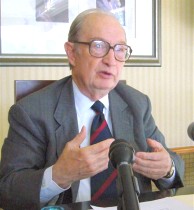2006年VOA标准英语-Scholar on North Korea Says Country is Working
搜索关注在线英语听力室公众号:tingroom,领取免费英语资料大礼包。
(单词翻译)
By Luis Ramirez
Beijing
23 September 2006
A U.S. scholar, who just visited North Korea, says Pyongyang plans to unload more fuel rods at its Yongbyon nuclear reactor1, which would boost its weapons capability2. The move appears to be aimed at pressuring the United States into one-on-one talks.
-----
 Selig Harrison talks to reporters in Beijing, Saturday |
||
On Saturday, Harrison spoke3 to reporters in Beijing after a four-day trip to North Korea, where he met with senior officials.
"The most important thing I learned, and the one clear news piece from this visit, is that North Korea is planning to unload the fuel rods, again, in the Yongbyon nuclear reactor to reprocess more plutonium, enough plutonium for three-to-six more nuclear weapons, depending on when they unload it," he said.
Among the officials Harrison met was Vice4 Foreign Minister Kim Kye Gwan, North Korea's chief nuclear negotiator. The U.S. scholar said Kim told him the unloading could begin this autumn and no later than the end of the year.
North Korea first unloaded some spent fuel rods last June, in a move that some analysts5 say was meant to spark concerns that Pyongyang was preparing to test a nuclear weapon.
Harrison says the current gambit is aimed at getting the United States to agree to direct talks.
"They are speeding it up because they want to use Yongbyon as leverage6 to get bilateral7 negotiations8 with the United States to resolve the stalemate over resumption of the six-party talks," he added,
The six-party talks - which include China, Russia, South Korea and Japan - have been stalled since late last year when the United States imposed sanctions for the North's alleged9 money laundering10 activities and other financial crimes.
Harrison says the North Koreans, in announcing their plans to reprocess more plutonium, hope the United States will back down and ask for negotiations on the sanctions.
The United States has ruled out any preconditions to resuming six-party talks, which began in 2003, shortly after North Korea was accused of violating its international nuclear agreements with a secret weapons program.




